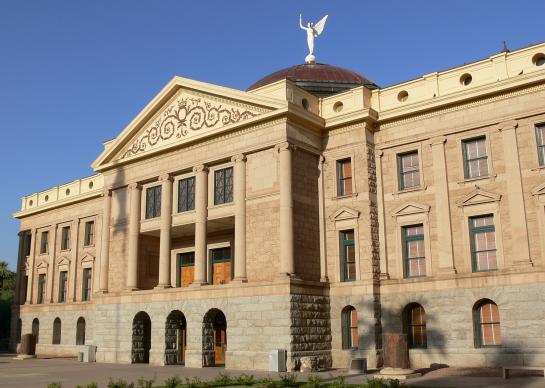2022 AZ Legislative Summary 07-08-2022

The 2022 legislative session was shaped by a mix of cooperation and conflict, high-profile feuds, and unexpected alliances. It included a record-breaking budget surplus and big policy wins on both sides of the aisle. It ended in the early-morning hours of June 25 – 166 days after it began – tied for the fifth-longest session in Arizona history.
A variety of factors shaped the session and its outcomes:
- Division
The policy debates, budget negotiations, and final outcomes of the year were shaped by marked and growing division – between political parties but also within Democrat and Republican caucuses. Unsettled disagreements from prior years simmered below the surface, occasionally erupting to challenge cooperation when it mattered most.
- Deadlines
Lawmakers introduced 1,747 proposals this year. It was not a record, but it was a lot. Deadlines were the only mechanism that forced legislators to prioritize their efforts and decide some of the most significant policy issues. A constitutional deadline in March forced lawmakers to temporarily address a limit on school spending. The end of the fiscal year was the only motivator that led lawmakers to agree on a budget plan after months of closed-door delays and disagreements.
Self-imposed timelines also helped the legislature narrow down its options on issues that drew lots of opinions. For example, there were more than 160 bills about election procedures and voting. Another 40 addressed COVID-19 mitigations and how they’re imposed. Committee hearing deadlines culled the many options and many topics, slowly guiding the discussions toward what was feasible in a sharply divided House and Senate.
- Decisions
Court decisions provided an outside force that guided legislators this year. Budget discussions were shaped by rulings against Proposition 208’s education funding mechanism and an initiative challenging last year’s income tax cuts. Litigation on early voting laws influenced legislators’ actions and positions on election-related bills. A U.S. Supreme Court ruling about abortion brought protesters to the Capitol and shaped a very unusual end to the legislative session.
- Determination
This was the last legislative session for Governor Doug Ducey and Senate President Karen Fann, and the last year Rusty Bowers will be Speaker of the House. Many members of both political parties are leaving the legislature to pursue other jobs or elected positions. These changes added meaning and focus to the session: Officials wanted to complete a legacy and accomplish big priorities before they left office.
Their goals did not always align, and scrutiny of the 2020 election was one high-profile example. President Fann was the leader of the effort to question the processes and security of the 2020 election; Speaker Bowers won national recognition for his decision to block that conversation in the House.
Disagreements sometimes pushed aside cooperation. Fueled by a determination to succeed in their top priorities, lawmakers expressed criticism of their colleagues more forcefully than usual. Opposing viewpoints became personal and sometimes turned into insults or accusations in floor speeches, media interviews, and social media posts.
- Districts
Redistricting is never an easy process, and Arizona’s new legislative lines added tension to some legislative relationships. Several new districts pitted current lawmakers against each other, sparking new hurdles to cooperation even within the same political party. The changes led several legislators to retire and will mean that at least four lawmakers will lose their seats because three incumbents are running for just two seats in those districts.
- Dollars
At the start of the session, legislative economists announced the state had a $3.1 billion budget surplus. By the time a state budget was enacted just days before the end of the fiscal year, that surplus had grown to more than $5 billion. The higher-than-expected revenue created new possibilities, but it also enhanced the divides between Republicans who wanted to use the money for ongoing tax cuts and those who wanted to assign it to one-time investments.
When it became clear that Republicans could never find a compromise amongst themselves to enact a budget, Republican leaders turned to Democrats and quickly crafted an agreement that earned support from most members of both parties.
The enacted budget focused mostly on one-time investments for infrastructure and debt reduction. It addressed shortfalls in the state’s pension systems, added to savings, and increased state employee pay. It boosted funding for K-12 and higher education and started a multi-year investment in water resources and infrastructure.
- Distinction
Once they reached the end of the legislative session, both Republicans and Democrats reflected positively on it. There were significant policy outcomes: Republicans enacted a school choice expansion they had long sought, and Democrats saw the Housing Trust Fund increase even more than they’d proposed year after year. Members of both political parties celebrated increased payments for foster caregivers that care for a member of their own family, incentives to grow the state’s health care workforce, and changes to short-term rental regulations.
This legislature’s work isn’t done. Lawmakers will return to the Capitol throughout the rest of the year to participate in study committees, evaluate audit reports of state agency performance, and address constituent concerns. There’s change on the horizon, though. After this year’s elections, at least 30% of the legislature will be different. There will be a new governor, new state elected officials, new partnerships to forge, and new ideas to pursue. The current legislature – the one that experienced the uncertainties of a pandemic, navigated unprecedented state tax revenues, mourned the death of former legislators, fought about what election security and democracy itself should look like, and welcomed 11 new colleagues when resignations shook up the House and Senate – is coming to a close.